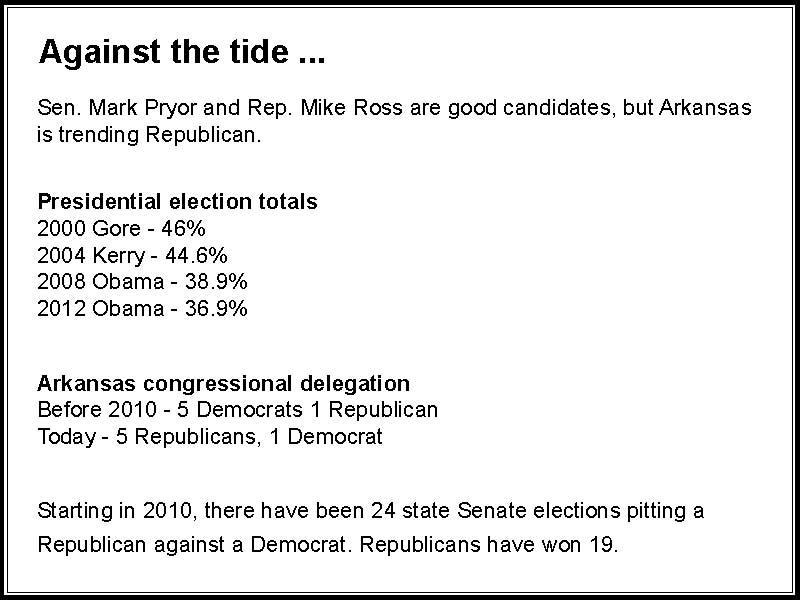By Steve Brawner
He’s a Democrat running for a high-profile statewide office. He’s developed a reputation through the years as a centrist willing to work with both sides of the aisle. He excels at retail, face-to-face politics. He faces a Republican attorney who doesn’t.
I could be describing Sen. Mark Pryor or Mike Ross. They’re similar elected officials facing similar opponents, and yet in the Senate race Pryor is usually polling several points ahead of his opponent, Rep. Tom Cotton, while Ross is polling behind Asa Hutchinson in the campaign for governor.
Why the difference between Pryor and Ross so far? One theory: They’re competing with each other a little bit, and Pryor is winning. Perhaps the most intriguing matchup this year is not Pryor vs. Cotton, or Ross vs. Hutchinson. It’s Pryor vs. Ross.
Let’s start with more conventional explanations for those polls, and then I’ll explain that theory. Pryor is a statewide figure who has represented all of Arkansas in the Senate for 12 years. He still enjoys good will because of his father, former Sen. David Pryor. Ross represented only one-fourth of the state as a member of the U.S. House of Representatives, and he’s been out of office for nearly a year-and-a-half.
As for their opponents, Hutchinson, the longtime Arkansas political figure, is a more polished candidate than Cotton. Hutchinson knows how to soften his stances and appeal to folks in the middle, while Cotton seems to know only one speed – full ahead. We like our politicians on a first-name basis here: Mike, Mark, Blanche, etc. We all know who “Asa” is, but Cotton, whom we just met a couple of years ago, is not yet “Tom.”
Other explanations? Because the Senate seat is so important nationally, the race has attracted millions of dollars in campaign ads that have taken the shine off Cotton. Hutchinson and Ross really haven’t laid a glove on each other yet. Meanwhile, Hutchinson was involved in a primary contest against an active opponent, Curtis Coleman, so his campaign has been somewhat in the public eye. Ross faced an inactive primary opponent and has been mostly laying the groundwork for the general election.
Let’s get back to the theory that Pryor and Ross are competing against each other.
Resources are limited. There is only so much campaign money, and there are only so many volunteers with only so much time and energy. There is only so much space for yard signs and bumper stickers.
That’s the case with any campaign season, but this year’s races are occurring in the context of a Republican surge in Arkansas that may have peaked but hasn’t ended. When there’s a trend, there’s more room for one outlier than two.
Of course, hanging over all of this is the fact that President Obama is still in office, he’s still a Democrat, and, right or wrong, he’s still deeply disliked by many Arkansans.
Arkansans like to think of themselves as independent. We have a history of splitting our tickets. Until 2010, this was one of the more Democratic states in the country, and Democrats still hold a lot of power at the local and state levels.
Given all that, some diehard Obama-dislikers will be prepared to vote for a member of Obama’s party in either the U.S. Senate or the governor’s race. But they won’t vote for a member of his party in both of this year’s major races. Doing so would be too much of an endorsement of him and what they believe he represents. Pryor and Ross are competing for those voters.
Republicans still have the momentum in Arkansas. Pryor and Ross – both very good politicians – are trying to swim against that tide. It’s foreseeable that one can do it. It’s harder, though certainly not impossible, to see both winning. They’ve both got a lot to compete against, including, in some ways, each other.
Anyway, that’s one theory.
